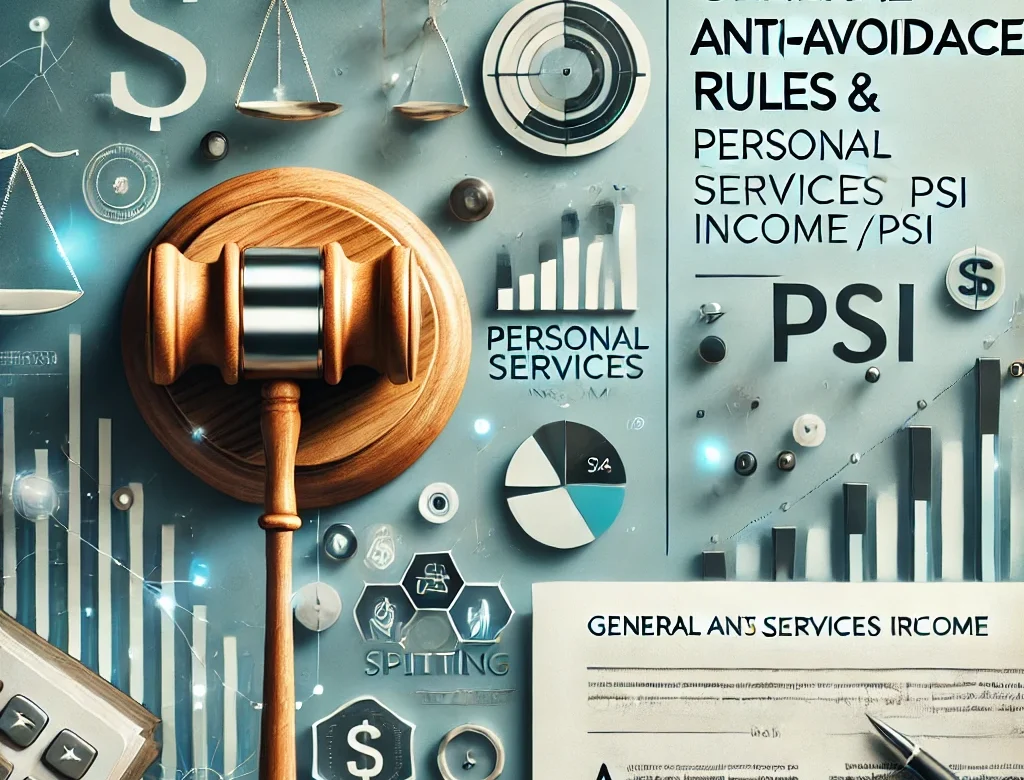Overview of general anti-avoidance rules
This information is relevant to you if both of the following apply:
- You receive personal services income (PSI) as a sole trader or through your company, partnership or trust.
- The PSI rules don’t apply to your income because you are carrying on a personal services business (PSB).
The PSI rules were introduced to prevent the diverting, alienating, or splitting of income with other individuals or entities in an attempt to pay less tax.
The general anti-avoidance rules (GAAR) may still apply if you are a PSB and the PSI rules don’t apply. For the GAAR to apply to your arrangement, there must be a sole or dominant purpose to obtain a tax benefit.
When the GAAR may apply
The GAAR may apply where there are factors indicating that the dominant purpose of the arrangement is to obtain a tax benefit by diverting, alienating, or splitting your PSI or retaining profits in your lower-taxed company, partnership, or trust (being an interposed entity).
In deciding whether the PSB has engaged in income splitting to gain a tax benefit, the following considerations may be relevant:
- Whether the salary or wages paid to you is commensurate with:
- The skills you exercised or services you provided.
- The income received by the PSB for your services.
- Remuneration commensurate to the value of your services will generally be the gross amount received by the PSB for your services, less allowable deductions (other than deductions associated with non PSI income of the PSB or income splitting).
- Whether the PSB distributes income to associates and does not distribute income to you, the individual who provided the actual services.
- Whether the salary or wages paid to associates by the sole trader or PSB is not commensurate with:
- The skills exercised and services provided by the associate.
- The income received by the sole trader or PSB is for services performed by the individual.
Examples include if you:
- Use a company, partnership, or trust to retain profits from your PSI.
- Divert, alienate, or split your PSI with an associate – which reduces your overall income tax liability.
- Create an entitlement to deductions which would not be available to an individual providing the same services as an employee.
Example: When the GAAR may apply
Jason provides services as a computer analyst through his trust, JB Trust. Jason’s wife and children are also beneficiaries of JB Trust. The contract price for Jason’s services is $120,000.
Through the income year, Jason is paid a salary of $50,000 by JB Trust to perform his services. JB Trust also incurs $25,000 of deductions. The balance of $45,000 is distributed to Jason’s wife and children, who are in the lowest marginal tax rate.
The JB Trust self-assesses as a PSB due to passing the results test. The PSI rules don’t apply to the income. The GAAR may apply to the arrangement JB Trust has in place, as Jason may be obtaining a tax benefit by splitting the income with his associates.
If the GAAR applied, then the tax benefits would be cancelled. This is done by making a determination, and relevant amounts would be deemed to be included in Jason’s assessable income.
Consultation on draft Practical Compliance Guideline
A draft Practical Compliance Guideline (PCG2024/D2) was published on 28 August for public consultation. The draft Guideline outlines the types of alienation arrangements that we consider to be of ‘low’ or ‘higher’ risk of the general anti-avoidance provisions of income tax law (Part IVA) applying and the likelihood of us reviewing those arrangements.
Submissions are due by 11 October.
For more information and to make a submission, visit PCG 2024/D2 Personal services businesses and Part IVA of the Income Tax Assessment Act 1936.
Please note: Many of the comments in this publication are general in nature, and anyone intending to apply the information to practical circumstances should seek professional advice to independently verify their interpretation and the information’s applicability to their particular circumstances.










